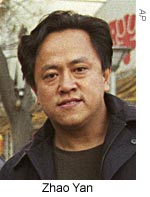New York, September 14, 2007— The Committee to Protect Journalists welcomes reports than Zhao Yan, a Chinese research assistant for The New York Times, is expected to be freed on Saturday morning, according to the Times. If released, Zhao will have served his combined three-year sentence in prison and pretrial detention on a fraud conviction, a charge which sources familiar with the situation told CPJ were unsubstantiated.
The news of Zhao’s impending release comes as Li Yuanlong, a reporter with the daily Bijie Ribao, was released in the early morning hours of September 14 upon the completion of his two-year prison sentence. The news was released by the U.S.-based Web site Boxun’s editor Watson Meng. Li had been charged with “inciting subversion of state authority” for articles he posted online. Li was charged on February 9, 2006, after being detained September 9, 2005.
“We welcome the release of Zhao Yan and Li Yuanlong, but neither of them should have ever been imprisoned in the first place,” said Joel Simon, CPJ’s executive director. “Their release still leaves 28 journalists in prison in China. We hope that this is a first step toward honoring China’s assurances to the International Olympics Committee for ‘complete freedom’ for the media in time for the 2008 Games in Beijing next August and that the country will go on to release all imprisoned journalists.”
Zhao, a news researcher at Beijing bureau of The New York Times and a former investigative reporter for the Beijing-based China Reform magazine, was detained on September 17, 2004, in Shanghai less than two weeks after the Times ran an article correctly predicting the retirement of President Jiang Zemin from his final leadership post.
Zhao was held under suspicion of “providing state secrets to foreigners,” a charge that denied him access to a lawyer for nine months after his initial detention, prolonged his pretrial detention, and cloaked his case in official secrecy. Leaked state security documents confirmed that Zhao was detained in connection with the September 7 article on Jiang’s retirement, but indicated that the sparse evidence against him consisted of only a brief handwritten note taken through unknown means from the Beijing office of The Times. As the more serious charge faltered in court, the fraud charge was added in April 2005. After a series of delays, Zhao was tried in June 2006 in closed proceedings in which he was not permitted to call defense witnesses. He was finally convicted on August 25, 2006 of fraud charges stemming from an accusation that Zhao took 20,000 yuan (US$2,500) from a local official with the promise of helping him get released from a work camp in 2001, but in a very rare move for criminal cases brought to trial in China, acquitted him of the more serious state secrets charges due to “insufficient evidence.”
Li Yuanlong, a reporter for Bijie Ribao daily newspaper in Guizhou province, was detained in September 2005. He was tried on May 11, 2006, in a five-hour hearing on charges of “inciting subversion of state authority” for online articles criticizing the Chinese Communist Party. In July, Bijie Intermediate People’s Court sentenced him to two years in prison. Li’s articles about poverty and unemployment in his home province angered local officials, according to the U.S.-based advocacy group Human Rights in China. He told his lawyer that he began writing essays and posting them online after becoming increasingly frustrated with the “lies and clichés” he was writing for his state-controlled newspaper, and felt that it was his responsibility as a reporter to expose injustice and inequality. Upon his release, he returned to his home in Bijie.
